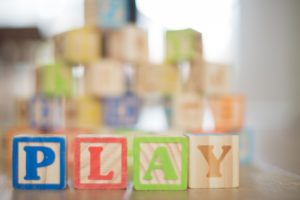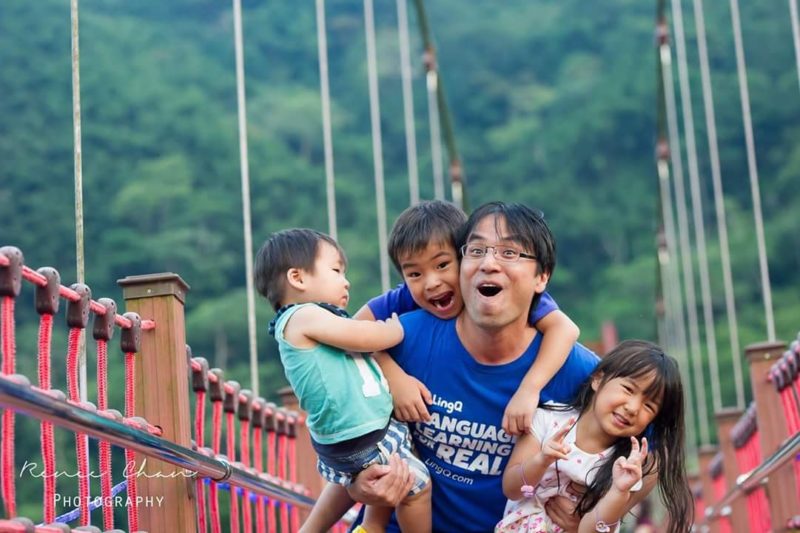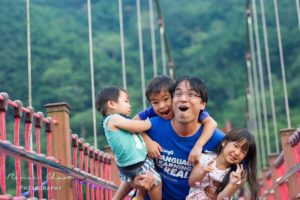Raising kids is hard. And raising them in a multilingual environment is even harder. That’s why Testu Yung is an inspiration to me. He serves as a role model for parents like myself who are raising their children in a multilingual environment. This piece will highlight his awesome impact on language-learning and why anyone who’s interested in learning languages needs to know who Tetsu Yung is.
Born in Hong Kong to a multilingual family, he has a true understanding of what it means to be a global citizen. Tetsu spent his childhood in Taiwan, where he learned to speak Mandarin from his father and his family, Japanese from his mother and her family, and English from attending an American school. He would also learn some Taiwanese and a local dialect, Hakka.

But his exposure to language wouldn’t end there. He eventually went to high school in Quebec where he learned French. And after a time there, he joined his friend on an exchange trip to Ecuador where he picked up Spanish.
It was this background in language-learning as a child raised in a multilingual family combined with a genuine interest in language-learning that led him to understand the value of a multilingual upbringing. Inspired to help others raise their children in a multilingual environment, he would write, Pampers to Polyglots: 7 Ideas for Raising Multilingual Kids Like Me in 2015.
Today, he speaks English, French, Japanese, Mandarin, and Spanish. He also organizes LangFest, an international event that gathers together polyglots and language enthusiasts from around the world to share their stories, insights, and passions for language learning. And now as a father himself, Tetsu lives what he practices, raising his kids in a multilingual environment to better prepare them for lives as global citizens.
How Tetsu Uses Language to Make the World a Better Place
Tetsu illustrates how creating a language-learning environment can rapidly help anyone learn a new language. And while his main focus is with helping raise multilingual children, his ideas have universal applications for anyone interested in or struggling with learning a foreign language.
At the core of his ideas rests an understanding of what it’s like to be a child in a multilingual family and a parent of multilingual children. Growing up, his parents created positive learning experiences around him that were free from pressure. They presented language to him, not as a subject to be studied, but as an everyday part of life. As a result, he grew up without any fear around language-learning. It was simply a process anyone went through to acquire a new language.
This is similar to my own upbringing. As the child of Syrian refugees who immigrated to the US in the 1970s, I grew up with bilingual parents. But my parents fell into the traditional trap many immigrant families make: they prioritized English learning over a multilingual approach. They feared that learning other languages might interfere with the need to learn English.
Luckily, the thought around multilingual upbringing has changed quite a bit. Science has helped highlight just how capable kids are at learning new languages. And now that I am a parent and have a much better understanding of language learning, I’ve worked hard to create a multilingual household for my family so that my kids can experience the benefits of being raised as multilingual, global citizens.
What Are The Best Strategies for Raising Multilingual Children?
Tetsu covers his upbringing in-depth in his book, Pampers to Polyglots. In the book, he details both his own childhood and that of his kids. There is one common thread throughout his piece: for successful language learning to occur, you need exposure to the target language. And Tetsu takes huge strides to make that happen for his children.
He lays these strategies out beautifully in his book, and if you’re a parent or plan on being one, I strongly recommend that you pick it up. I was relieved to find out that I’m already using many of the expert-level strategies Tetsu describes. I also learned new approaches as well.
The Critical Period Hypothesis
Tetsu knows first hand that children have the advantage when it comes to language-learning in that they have plenty of time to practice. As we grow older, it becomes increasingly difficult to learn a language due to time constraints from responsibilities, Kids, on the other hand, seem to have all the time in the world. Additionally, they’re more at ease with making mistakes. Finally, they have the biological advantage in that they’re able to pick up sounds adults can’t hear.

Learning more than one language as a child makes it easier for you to learn more. It rewires your brain for language-learning. That’s why it’s usually easier to learn a third or fourth language. But this background also provides simple reassurance from an early age that it’s possible to learn multiple languages.
True Immersion
Tetsu argues that children need ample exposure to languages. One common problem many people have with immersive language learning is that they move to foreign countries with the intent to learn a language, but then surround themselves with familiarity. Globalization, ironically, makes it easier than ever to physically leave your home but still take much of it with you.
Instead of letting your children hang out in their comfort zones, Tetsu argues that you encourage them to live like locals. Making friends who are native speakers, watching TV in the local language, and joining local groups can make it much easier for your children to rapidly achieve fluency in the target foreign language.

One Person, One Language (OPOL)
As the child of a Japanese mother and a Taiwanese father, Tetsu grew up speaking to his parents in their specific native languages. And while he learned English at school, he didn’t speak to his parents in it. As a father now, he continues with that tradition. This allows him to reinforce his children’s language skills regularly.
Tetsu argues the importance of OPOL when raising multilingual children. Failing to do so, switching to a foreign language in your home, will make it harder to reinforce those standards. Without that consistency, it becomes increasingly likely that your children will lose fluency in their native language.
Contextual Language Acquisition Philosophy (CLAP)
Every day is full of activities and opportunities to help your children learn a foreign language. CLAP focuses on taking ordinary activities and moderating them slightly so your children can use them to learn new languages rapidly.
As a child, Tetsu’s mother would purchase remote control cars for him to build, but the instructions were in Japanese. His love for car building guided him through his language learning so regularly that it was more a way of life for him than a language lesson. This is the basis for CLAP. You simply find moments where you can incorporate foreign language exposure into play, making the experience more effective and interesting for your children.

The Use of Native Speakers
Another aspect of Tetsu’s effectiveness relies on his use of native speakers. Between trips back to Japan and Taiwan for his family and communication within the family, Tetsu also outsources language exposure through au pairs. By hiring babysitters for his children and asking them to speak to his kids in their native language, Tetsu further provides the conversational exposure his children need to reinforce their language-learning lessons.
Establishing a Positive Language Learning Environment
Tetsu also knows that language-learning is as much a mindset as it is about exposure. Instead of pushing language on his kids, he makes it a fun experience full of positive reinforcement. Children don’t have the monitor filters that adults have. This allows them to more readily speak a foreign language, making mistakes more often but also learning from them.
There’s no anxiety around language-learning for children. It’s what they’re meant to do. By instilling this core value into their lessons from an early age, he helps his children feel far more at ease with foreign languages.
He also understands that a language learning environment needs to be authentic. You want to avoid stuffy, classroom-like settings, and you don’t want the process to feel like a chore. It’s not about giving your kids another subject to study. Instead, it’s about making language an everyday part of their lives. As such, it also needs to be consistent. Avoid certain “language days”, for instance. By setting up a routine and clear guidelines so your children know when to speak which language.
Know Which Languages to Focus On
Which languages do you choose to expose your children to? When making this decision, you need to take ethnic heritage, economic opportunity, and pragmaticism into account. For Tetsu, this was easy as his parents each spoke a different language, plus, there was a need to learn English for economic purposes and French because he was living in Quebec.
Take your native language, ethnic languages, economically powerful languages, and any local languages into account when deciding on which languages you should promote for your family. The more pragmatic you are in your approach, the easier it will be for your children to have the necessary language exposure needed to reach fluency.
Know What to Expect
There are only so many hours in a day, and learning multiple languages at once can have some drawbacks at first that fall away. Your children may experience delayed speech, for instance. Although this does not seem to be fully validated scientifically. As a matter of fact, this may often be a result of stress. In fact, it’s very common in monolingual families as well. This is why Tetsu emphasizes creating a low-stress environment to help your children feel comfortable with using the multiple languages they’re learning.
Prepare for Code-Switching
Code-switching is common. This is when a multilingual child uses multiple languages while communicating in a specific instance (use two or more languages in one sentence, for example). To people not familiar with the language-learning process, it may spark anxiety in them as they fear their kids may be “mixing up languages”. However, there’s no need to panic. Over time, code-switching resolves itself without any long-term developmental delays.
Avoiding Native Language Shame
Sadly, we live in a world steeped heavily in misunderstandings. Despite being increasingly globalized, there are still many barriers language-learners face. As a result, avoiding ridicule for speaking a minority language can be challenging. Understanding that it has as much to do with where you’re learning a language as to when you are, is the first step. This will help you better prepare for it when it happens.

When I was growing up, for example, people thought it was lame to speak another language. Nowadays, many Americans think it’s “cool”. Despite that, if you speak an unfamiliar language, one that’s rarely seen or used (such as my ethnic language, Circassian), some people will ask why you even bother, or worse, they call it “useless”. Whether or not our kids will grow up and continue to speak their native languages depends on them in the long-run.
Why You Should Raise Your Child to Be Multilingual
We live in a world that increasingly values global citizens. English may be the lingua franca, but the need to know a variety of ways to communicate continues to grow. Globalization makes our world smaller every day and knowing multiple languages can give your child the advantage. More so, it can make their lives much easier, as Tetsu notes, because it removes the “opportunity cost”.
In business, the opportunity cost is your initial investment in any endeavor. If you want to major in Business, for instance, you need to spend time and money getting that degree. As a child, you’re more adept at learning languages, but you’re not capable of mastering high-level, analytical skills that you need to work towards later in life.

This means that parents who work with their kids earlier on, teaching them multiple languages, free up time for them later in life to focus on other avenues, giving them the advantage. Imagine how many hours your child will have at their disposal if they already know multiple languages going into university. They can use that extra time to get further ahead of their peers.
A multilingual upbringing has other noticeable benefits for children that Tetsu more thoroughly lays out in his book. Ultimately, raising multilingual children means providing your kids with as many chances as possible to be successful in this globalized world.
Just remember: We can lead them to the door, but whether they decide to open it and take advantage is their decision. As parents, we owe it to them to give them the chance to MAKE that decision.
What Is LangFest?
Tetsu is the founder and host of LangFest, a week-long, annual event held every August in Montreal, Quebec. During the event, language enthusiasts come together to hear entrepreneurs, educators, language gurus, and industry professionals talk about linguistics and language learning. The event typically covers everything from tools to techniques, sharing the gift of how to learn and use new languages.
It’s the perfect environment for anyone to share the languages they’re learning and the ones they love. The event caters to second and third language learners as well as many well-known polyglots. You can find major world languages like Spanish, French, Russian, Chinese, and other, smaller languages like Gaelic, Cree, and others.
The event serves as a yearly opportunity to immerse yourself in languages with activities like talks, tours, and other social events. Language-learners from far and wide are invited to check it out and share their experiences while forming new, international friends to keep the conversations going.
How You Can Learn More About Tetsu Yung
Tetsu is a very active member of the language learning sphere. Aside from regularly hosting LangFest, you can reach out to him directly on his website for more information on how to raise bilingual/multilingual and multi-talented kids. He offers 30-minute meetings to unlock the full potential of your children’s language learning ability.
In that session, he will cover everything from establishing an effective language learning environment to how to encourage success in your children’s attempts to learn multiple languages.
If you’re interested in connecting with him, you can reach him using the methods below.
- Website: www.asktetsu.com
- Email: [email protected]
- FB/YT/IG/TW: @asktetsu
- Youtube: AskTetsu, LangFest
And if you want to see the results of his efforts, you can watch his son speak 5 different languages in less than a minute. It’s pretty cool.







